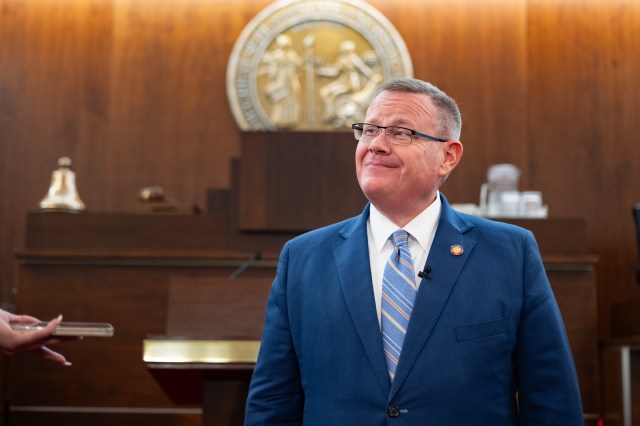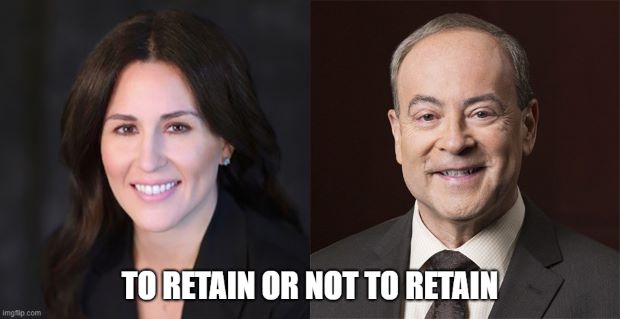At the top of the ticket, Republican presidential nominee Donald J. Trump has been in contortions over the abortion issue. Just below, Indiana gubernatorial nominee Mike Braun’s running mate, Micah Beckwith, is comparing President Joe Biden to Pol Pot and Joseph Stalin while giving credence to disproven claims that childhood vaccines could cause autism.
In the pre-Trump era, these stories would have dominated news coverage.
For Braun, they are just static and noise. He told reporters at Indiana Republican Party headquarters on Friday that he plans to “plow through” the nonessential rhetoric.
“Most people are not voting for Terry Goodin or Micah Beckwith,” Braun said of the two major-party lieutenant governor nominees. “You can try to tie me to him and that’s OK. But I’ll plow through that and make sense to most Hoosiers.”
The “you can try to tie me to him” stance does not remotely resemble the old running mate notion, which has long been the façade of party unity. This pairing is more like an arranged marriage, with both participants donning brave faces and tense smiles.
Braun spoke with reporters last Friday about the state of his race against Democrat Jennifer McCormick and Libertarian Donald Rainwater. Democrats put out a memo late last week suggesting she was “uniquely situated” to win. But the Democrats presented no data sets.
“If their internal polling was any good, they would be out with it publicly,” Braun said.
He didn’t tip his hand on what his internal polling was showing. And yet Braun suggested that President Biden’s shocking withdrawal from his reelection bid on July 21 had altered the campaign dynamic, even here in ruby-red, Trump-loving Indiana. Braun also acknowledged that the reproductive rights issue has been fortified with the emergence of Kamala Harris as the Democratic presidential nominee.
“I will say that a lot of this race has the national dynamic tied to it,” Braun said. “I can tell you, and you all know it, I think the other side of the aisle was riding a train wreck into November with Biden. They obviously saw that wasn’t going to work.”
Braun said the Democratic ticket switch is “the biggest factor, in my opinion, impacting all down-ballot races.” But, he added, “Everything we’re seeing, we’re in as solid of a place as we’ve ever been in any of the other three elections. I feed off that adversity.”
That comment was in reference to his 2018 primary win against two congressmen, his general election victory over U.S. Sen. Joe Donnelly, and his GOP gubernatorial nomination against five Republican opponents in this past May’s primary.
“At the national level you get, depending on how you deliver the message on whatever it is you’re talking about, it becomes very divisive,” Braun said when Howey Politics Indiana/State Affairs asked him whether Trump’s evolving positions on abortion were making Braun’s life as a candidate difficult.
“The reason that has changed and is impacting down ballot is the other side of the aisle is reenergized because they didn’t have the inevitability of a bad outcome in November,” Braun said. “Now it’s up to our side to do a better job of articulating the issues that we don’t do a good job of that nationally. Yes, that has had an impact and I’m going to plow through that. So, yes, I think that has had an impact.”
Asked if Indiana has seen a spike in new female voter registrations, Braun said it will impact his race.
“Generally, nationally that is true,” Braun said. “You’ve got to make sure you’re not turning a deaf ear to it. When it comes to that, I think you’re seeing the Republican Party on IVF making sure it’s clear where we’re going to stand. If you’re not attentive to that, you’re navigating at your own peril.
“I don’t think that will be the defining issue,” he continued. “I think it will be an issue, though, that if you’re hurting on the kitchen table issues of the economy, workforce, health care, rural broadband, affordable housing, electricity in our own state, the availability of water, I know I’m going to win on them. I just don’t think it’s going to carry the day. That doesn’t mean I’m not going to be attentive to that.”
Has Trump’s abortion contortions hurt him?
“I’m pro-life. I’m sensitive that we’re a pro-life state,” Braun said. “I’m sensitive to the fact that those [issues] change, just like other issues change over time. I’ve been clear I’m going to focus on the issues that are on the kitchen table, not the ones that are inherently divisive. That is going to take me to a margin above 50%. That’s been difficult to do in any gubernatorial race in recent history.”
Does he expect to run behind Donald Trump in Indiana?
“That’s so hard to predict; there’s such a solid floor to his support,” Braun said. “It’s his ceiling in swing states that will be the issue, not here in Indiana.”
Howey Politics Indiana/State Affairs, FiveThirtyEight, Cook Political Report and Sabato’s Crystal Ball have the Indiana governor’s race as “safe” Republican.
Braun and Beckwith
But Sabato’s analysis (published in the Sept. 5 edition of Howey Politics Indiana/State Affairs) observed, “There are some interesting subplots in each state that may give Democrats a glimmer of hope. For instance, Braun saw state GOP convention delegates foist a far-right lieutenant gubernatorial candidate, Micah Beckwith, onto his ticket. These factors hypothetically could help Democrats running in those states: party-switching former state Superintendent of Public Instruction Jennifer McCormick in Indiana.”
At Friday’s media briefing, Braun described Indiana as a generic “55%/45% state” favoring Republicans. “There’s the Libertarian component that they are mostly teed off at the prior administration, not me, but you inherit all of that.”
Reporters asked him about Beckwith’s recent social media posts on child vaccines; a meme on Instagram saying the government wants to take your guns and wedding rings; and Beckwith’s “Jesus, Sex + Politics” podcast suggesting childhood vaccines can result in autism.
“We’re seeing more and more trends leading towards more autism, more physical ailments, like disabilities, things that are happening,” Beckwith said on his Aug. 9 podcast with Pastor Nathan Peternel. “A lot of that research is pointing to these mandatory vaccines that kids are required to get now.”
“First of all, I was clear at the convention when it turned out like it did,” Braun said of Beckwith’s nomination at the Indiana GOP convention. “He appealed to a part of our party that feels like it has been abandoned. I think if you’re in on that issue that is out of the mainstream, you’ve got to do that carefully.
“If you’re wearing it on your sleeve and it is a central part of what you’re doing, he has not done that generally. The more you get onto issues like that even though they only have merit in part of the conversation, that’s not what I am going to be focusing on,” Braun said.
Was the meme comparing Biden to Pol Pot and Stalin helpful?
“First of all, I think that is going to fall on so few ears,” Braun said. “If it is amplified, you can choose to do that. I’ll plow through it and that’s not going to carry the day.”
While Beckwith continues to post controversial items on social media, such as a meme of snipers under the caption “This is what our southern border should look like,” he hasn’t posted a podcast episode since Aug. 9.
What has Braun’s relationship with Beckwith been like?
“It’s been good,” Braun said. “He’s been out doing a lot of the stuff appealing to the grassroots part of the party. He was clearly the one who has been out there on property taxes. On the general issues I’m talking about, he’s reinforcing them.
“When you do get on there on something narrow, and I’ve said that at the convention, all I can tell you is that I’ll deal with that and that’s not going to resonate at the finish line,” Braun said.
He added, “We communicate often.”
But Braun’s campaign website displays logos that do not incorporate Beckwith into its branding. In fact, he is not mentioned at all. Beckwith has been posting “Braun/Beckwith” logos on social media.
Minutes after Beckwith’s upset victory over Braun’s endorsed lieutenant governor pick, Braun made it clear who will be calling the shots.
“There’s no doubting this — I’m in charge,” Braun said at a media scrum after the convention. “Micah is going to be someone who works with me. If he doesn’t, I think that means that it will probably be less fruitful what we are able to get done. My running mate can say whatever he wants. If it doesn’t make sense, if it doesn’t resonate, remember, I’m going to be the governor.”
On WIBC-FM’s “Kendall & Casey” show Monday after the convention, Beckwith said, “He’s right — he’s the governor. I’m not trying to be the governor. I never said I want to be the governor. He’s the guy who’s gonna lead the agenda. I’m not going to try to get out ahead of that in any way, shape or form.”
Beckwith has kept a steady campaign schedule, meeting with socially conservative groups. Braun suggests that has been a positive for the ticket. He’s given Beckwith a long leash. In the Trump era, when what was once shocking has now become just another meme on another day, Braun appears to be hoping that Beckwith just blends away.
McCormick’s cannabis plan
McCormick unveiled her Commonsense Cannabis Legalization Plan, which proposes to legalize the adult use of cannabis in Indiana in a responsible and well-regulated industry. This plan begins with the establishment of a medical marijuana industry, setting the foundation for a transition to full adult-use cannabis.
“Hoosiers have made it clear — they support adult-use cannabis and are frustrated by Indiana’s outdated prohibition laws,” McCormick said. “Our plan takes a commonsense approach by first introducing a well-regulated medical marijuana industry, allowing us to address potential regulatory challenges and ensure a smooth transition to well-regulated and legal adult-use cannabis.”
The McCormick-Goodin Commonsense Cannabis Plan includes the following key components:
- Establishing the Indiana Cannabis Commission: The plan will create the Indiana Cannabis Commission, responsible for overseeing the legal cannabis industry, including regulation, licensing and ensuring compliance with safety standards. This independent body will help Indiana develop a well-regulated cannabis market, protecting Hoosiers and ensuring transparency as the state transitions to full legalization.
- Establishing a medical marijuana industry: The plan calls for the immediate creation of a regulated medical marijuana industry, providing Hoosiers with access to cannabis for medical purposes. This step will allow Indiana to address potential challenges and learn from the experiences of other states before moving to full adult use.
- Transitioning to adult-use cannabis: While the initial focus is on medical marijuana, the plan outlines a clear pathway toward full adult-use legalization. This phased approach will mitigate system challenges and ensure Indiana’s cannabis market is well-regulated and effective.
- Regulating hemp-derived THC: The plan also addresses the issue of unregulated hemp-derived THC products flooding Indiana’s gas stations and smoke shops. By regulating these substances, the state will protect consumers and ensure that cannabis products meet safety standards.
- Generating more tax revenues: Legalizing adult-use cannabis could generate an estimated $172 million annually in tax revenues for Indiana, providing a significant boost to the state’s economy and funding for essential services.
“Indiana is an island of prohibition surrounded by states with legal cannabis industries,” McCormick added. “By taking a responsible, phased approach, we can ensure that our state is prepared for full adult-use legalization while immediately providing relief through medical marijuana.”
McCormick’s TV buy
On Sept. 3, Deborah J. Simon made a $150,000 donation to the McCormick campaign. Two days later, the McCormick campaign made what IndyStar described as a “six-figure” buy for Sept. 5-9.
On Sept. 5, Indiana Democrats issued a release saying McCormick launched her first two TV ads of the cycle: “What’s Right,” focusing on her history as an educator and statewide elected official, and “Places Like This,” focusing on her lifelong connections to rural Indiana.
McCormick appears to be using the Simon funding to establish a TV beachhead, hoping it will seed more funding for more TV ads.
Later today, the McCormick/Goodin campaign will release its “Commonsense Cannabis Legislation Plan.”
Female voter registration surge
TargetSmart’s Tom Bonier reports that new voter registrations of Hispanic women under age 30 have tripled since 2020 in Indiana; registrations of Black women under 30 have more than doubled.
Bonier posted on X Wednesday: “Just as I’ve been reporting on the ‘Harris Effect’, big registration jumps among young voters, women, and voters of color, I can’t wait to see if we experience a ‘Swift Effect’ in the next few days.”
That was in reference to pop star Taylor Swift’s endorsement of Kamala Harris following Tuesday night’s debate.
Buttigieg at Harris’ Indiana kickoff
U.S. Transportation Secretary Pete Buttigieg appeared at the Harris campaign’s Indiana kickoff Monday.
“I never thought that I would be addressing a group of Democrats recently, just after we all took in the news that Bernie Sanders and Dick Cheney were on the same side in a presidential election,” Buttigieg told Hoosiers on a Zoom call.
INDems’ statement on sexual harassment
The Indiana Democratic Party issued the following statement amid the Thomas Cook/Mayor Joe Hogsett scandal:
“All workplaces in our state should be free from sexual harassment. As an equal opportunity employer, the Indiana Democratic Party takes workplace harassment incredibly seriously. Indiana Democratic Party staff is unionized under a collective bargaining agreement, and employees of the party are supplied with an employee handbook which details the party’s anti-sexual harassment policies and procedures, including spelling out a detailed, independent reporting process to ensure no individual feels intimidated by having their voice heard and can freely share their experience without fear of retaliation.
“Campaign and municipal employees are not employees of the Indiana Democratic Party, but of their respective individual employers. Anyone who is a victim of workplace harassment of any kind should report the incident pursuant to internal reporting procedures as may be required by their respective employer, as well as to the Equal Employment Opportunity Commission, any appropriate applicable governmental agency, or to law enforcement, depending on the situation.
“We encourage all Democratic campaigns to have detailed anti-harassment policies and training and we are willing to connect campaigns with experts who work in this field.”
Brian A. Howey is senior writer and columnist for Howey Politics Indiana/State Affairs. Find Howey on Facebook and X @hwypol.


 Save the Date
Save the Date


